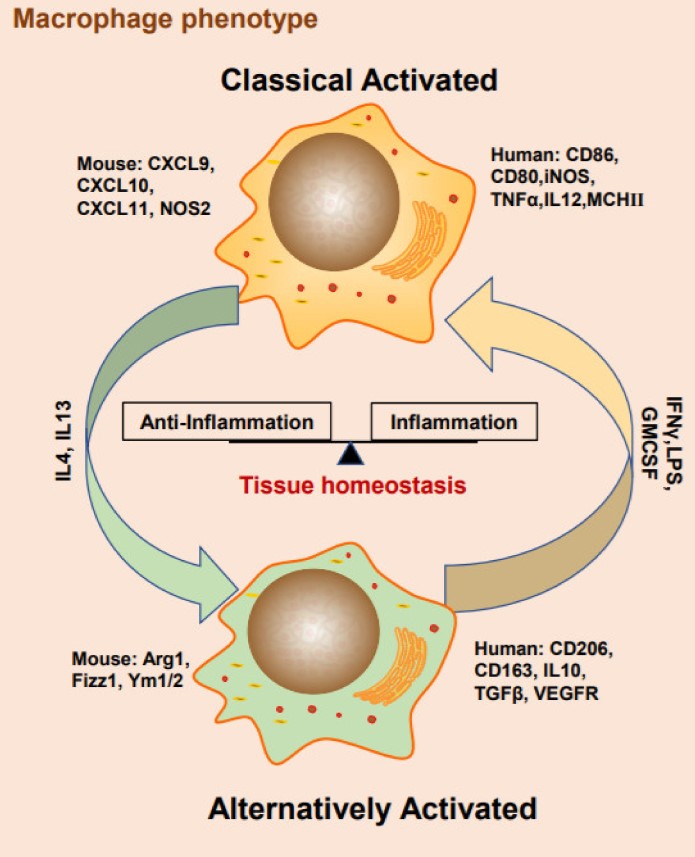All products and services are For Research Use Only and CANNOT be used in the treatment or diagnosis of disease.
In recent years cellular immunotherapies have demonstrated great therapeutic success in some cancers. Among them, chimeric antigen receptor macrophage (CAR-MA) demonstrated antigen-specific phagocytosis and tumor clearance in vitro. Partnering with Creative Biolabs ensures you capitalize on the market share early, cement your position as an industry leader and support the growth of safe and effective CAR-MA-directed therapies. Our lab offers our global customers high-quality macrophages activation and expansion service.
A change in morphology and behavior of a macrophage resulting from exposure to a cytokine, chemokine, cellular ligand, or soluble factor. According to activation methods, macrophages are divided into M1 and M2 macrophages. Canonically activated macrophages, also known as M1 macrophages (anti-tumor phenotype), act as proinflammatory mediators. Interferon-γ (IFN-γ) and the TLR4 ligand, lipopolysaccharide (LPS) are the most potent macrophage-activating factor, inducing M1 macrophages. Full macrophage activation requires the previous priming that may be provided by low levels of IFNs. M2 acts as an anti-inflammatory mediator and is considered to promote tissue remodeling and tumor growth.
 Fig.1 Macrophage M1/M2 polarization status maintains organizational stability. (Wang, 2021)
Fig.1 Macrophage M1/M2 polarization status maintains organizational stability. (Wang, 2021)
There are a large number of commonly used macrophage markers such as CD14, CD16, CD64, CD68, CD71and CCR5. The exact marker to be used will be dependent upon the subset of macrophages and the conditions of their local environment.
 Fig.2 Different phenotypes of macrophages and their markers. (Creative Biolabs)
Fig.2 Different phenotypes of macrophages and their markers. (Creative Biolabs)
There are several sources of CAR-MA cells. Some need to be induced to differentiate into macrophages, for example, induced pluripotent stem cells (iPSCs)-derived cells. We use the protocol of macrophage differentiation to produce CAR-MA. Undifferentiated CAR-iPSCs are treated with numerous kinds of cytokines to successfully differentiate into iPSC-macrophages. On other occasions, CAR-MA needs to be generated via ex vivo differentiation of peripheral blood monocytes into macrophages prior to genetic manipulation.
 Fig.3 CAR-modified iPSC-derived immune cells. (Tian, 2021)
Fig.3 CAR-modified iPSC-derived immune cells. (Tian, 2021)
As an industry-leading global CRO company, Creative Biolabs has constructed the cell culturing platform and the cell separation system to meet our clients' needs. We provide solutions for CAR-MA cell activation and expansion to support the development of CAR-MA-based immunotherapies. We are willing and able to provide global customers with the world's leading service sincerely. Please feel free to contact us for more details.
References
For any technical issues or product/service related questions, please leave your information below. Our team will contact you soon.
 NEWSLETTER
NEWSLETTER
The latest newsletter to introduce the latest breaking information, our site updates, field and other scientific news, important events, and insights from industry leaders
LEARN MORE NEWSLETTER NEW SOLUTION
NEW SOLUTION
CellRapeutics™ In Vivo Cell Engineering: One-stop in vivo T/B/NK cell and macrophage engineering services covering vectors construction to function verification.
LEARN MORE SOLUTION NOVEL TECHNOLOGY
NOVEL TECHNOLOGY
Silence™ CAR-T Cell: A novel platform to enhance CAR-T cell immunotherapy by combining RNAi technology to suppress genes that may impede CAR functionality.
LEARN MORE NOVEL TECHNOLOGY NEW SOLUTION
NEW SOLUTION
Canine CAR-T Therapy Development: From early target discovery, CAR design and construction, cell culture, and transfection, to in vitro and in vivo function validation.
LEARN MORE SOLUTION